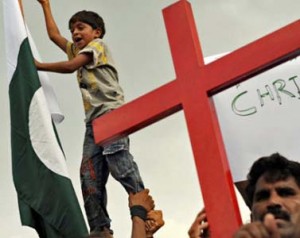LAHORE, Pakistan (Morning Star News) – In a rare instance in Pakistan, a judge granted bail to a pastor accused of blaspheming Islam because the complainant admitted that he had mistakenly accused him, attorneys said.
Karma Patras, a 55-year-old pastor of Bado Malhi, Sangla Hill, had been languishing in Sheikhupura District Jail since October after preaching on Christ’s sacrifice at a funeral attended mainly by Christians. Some Muslims present thought he was speaking against the Islamic animal slaughter ritual observed at the time, and Patras was confused when police showed up at his home later that day (Oct. 13) and arrested him on charges of defaming Islam (see “Pakistani Preacher Jailed for Sermon at Funeral,” Nov. 9, 2012).
Victims of false accusations of blasphemy in Pakistan usually spend months in jail without trial, and then many more months after conviction; if charges are dismissed, it does not usually happen until cases reach appeal, as most trial judges cannot withstand the pressure of furious Islamic extremists. Retraction of an accusation is also rare in Pakistan.
“Patras’ release is the rarest instance of a complainant in a blasphemy case retracting his statement,” one attorney said.
Pakistan is nearly 96 percent Muslim, according to Operation World, and religiously charged court cases commonly involve clamoring crowds of Muslims and other pressures coming to bear on lawyers and judges. Christians make up 2.45 percent of the population.
After Patras’ arrest, Muslim villagers forced his five married sons and their families to leave the area or be burned alive, an attorney told Morning Star News. They still do not dare to return to the village out of fear of attack.
The complainant in Patras’ case, Syed Zulqarnain Shah, stated on Thursday (Feb. 21) in Sangla Hill Judicial Magisterial Court that he had mistakenly accused Patras of committing blasphemy against Islam and that he would have no objection if the pastor were released on bail.
The public prosecutor argued that Patras could not be released on bail due to Shah’s retraction because the state was now the complainant in the case, the attorney said. The judge rejected this argument, saying that Shah was still the main witness so his statement was of pivotal importance. That Shah is no longer the official complainant in the case is presumably why the charges were not dismissed in spite of his retraction.
The Center for Law and Justice, an affiliate of the European Center for Law and Justice, is representing Patras in court.
Pastor’s Arrest
Patras had been invited to address a funeral gathering in the village of Mehmandwali, Chak No. 111-R-B, Sheikhupura, in Punjab Province, on Oct. 13. Preaching at the bereaved family’s house, he spoke of Jesus Christ’s sacrificial death and resurrection. Someone asked the pastor if Christians could offer animal sacrifice, the attorney said.
Patras replied that Christ had sacrificed Himself once for all. Quoting Isaiah 66:1-4, the pastor cited verses stating that God esteemed one “who is humble and contrite in spirit … But whoever sacrifices a bull is like one who kills a man.”
After the pastor returned home, only few hours had passed before police arrived and arrested him.
“The pastor was unable to make sense of why he had been arrested,” the attorney said. “He believes that he was charged under the anti-blasphemy laws because the area Muslims bore malice against the family where he had delivered the sermon.”
Saddar Sangla Hill Police Station charged Patras under Section 295-A of the Pakistan Penal Code for “outraging religious feelings.” Conviction carries a prison term of up to 10 years and a fine.
After Patras’s arrest, a mob of Muslims surrounded the police station and demanded that he be handed over to them, but Patras had already been transferred to another site. Unable to get Patras, it was then that area Muslims told his five sons to leave the village or else they would be set on fire, the attorney said.
The Christian community in the village, about 20 families, wept for the evicted families as they loaded their belongings onto tractor trolleys, he said. Since leaving the village, the five families have scattered to nearby villages.
Likewise, despite being released from jail, the pastor is living in another area, separated from his family; he fears for his life, and he does not want to jeopardize them.
A recent study by the Centre for Research and Security Studies (CRSS) found that those acquitted of blasphemy charges face threats from homicidal vigilantes. Of 52 people murdered after being charged with blasphemy in Pakistan, 25 were Muslims, 15 were Christians, five were Ahmadis, one was Buddhist and one was Hindu, according to the CRSS report.
Sangla Hill was the site of mob violence in November 2005 after a Muslim accused Yousaf Masih of burning a Koran. Some 2,000 Muslims attacked four churches in the area. Masih was later acquitted after his accuser, Mohamed Saleem, admitted that he had not seen the Christian set fire to a building used to store copies of Islam’s sacred book.
Area residents later said that Saleem had leveled blasphemy accusation after suffering heavy gambling losses to Masih.
###
© 2013 Morning Star News. Articles may be reprinted with credit to Morning Star News.
Morning Star News is a 501(c)(3) non-profit corporation whose mission is to inform those in the free world and in countries violating religious freedom about Christians worldwide who are persecuted for their faith. For free subscription or to make tax-deductible donations, contact [email protected], or send check to Morning Star News, 24310 Moulton Parkway, Suite O # 157, Laguna Hills, CA 92637, USA.
- Protests against Pakistan’s blasphemy laws. (Thepersecution.org photo)


